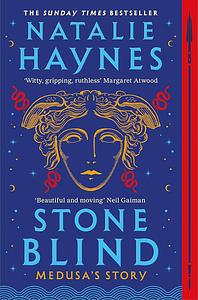Take a photo of a barcode or cover
I’m wary of new Greek mythology retellings because of the recent trend of making them into “dark romance”, distorting the source material so much in the process that at that point they should have just written something else. Natalie Haynes didn’t do that, for which I’m delighted.
The characters feel true to the myths, with their humanity enhanced by Haynes’ witty dialogue and meta commentary. I am particularly fond of the snakes POV. I do wish she’d had a bit more compassion for Perseus, who is simply a sheltered teenage boy with the emotional range of a stone, pardon the pun, doing his best. Which is tragically bad. Perhaps he had more of his father in him that was good for anyone, but I would have hoped Dictys would have had more influence in his ability to feel any sort of empathy for anyone beyond himself and his own mother. I think Haynes could have made him a little less sociopathic without changing the story.
The characters feel true to the myths, with their humanity enhanced by Haynes’ witty dialogue and meta commentary. I am particularly fond of the snakes POV. I do wish she’d had a bit more compassion for Perseus, who is simply a sheltered teenage boy with the emotional range of a stone, pardon the pun, doing his best. Which is tragically bad. Perhaps he had more of his father in him that was good for anyone, but I would have hoped Dictys would have had more influence in his ability to feel any sort of empathy for anyone beyond himself and his own mother. I think Haynes could have made him a little less sociopathic without changing the story.
medium-paced
Plot or Character Driven:
Plot
Strong character development:
No
Loveable characters:
Complicated
Diverse cast of characters:
No
Flaws of characters a main focus:
Complicated
adventurous
reflective
fast-paced
Plot or Character Driven:
A mix
Strong character development:
Yes
Loveable characters:
Yes
Diverse cast of characters:
No
Flaws of characters a main focus:
Yes
adventurous
reflective
sad
medium-paced
Plot or Character Driven:
A mix
Strong character development:
N/A
Loveable characters:
Yes
Diverse cast of characters:
Yes
Flaws of characters a main focus:
Yes
emotional
reflective
medium-paced
Plot or Character Driven:
A mix
Strong character development:
Yes
Loveable characters:
Complicated
Diverse cast of characters:
N/A
Flaws of characters a main focus:
Yes
I was in a reading rut and was gifted this book and it inspired me to get back on track with my goals! It’s an incredible retelling of Medusa’s story told from many perspectives. The language isn’t super complex and the way Haynes flips the narrative on its head is something I really appreciate.
Minor: Rape, Sexual assault
adventurous
dark
tense
medium-paced
Plot or Character Driven:
A mix
Strong character development:
Complicated
Loveable characters:
Complicated
Diverse cast of characters:
No
Flaws of characters a main focus:
Complicated
Graphic: Rape, Sexual violence, Violence, War
adventurous
inspiring
mysterious
reflective
medium-paced
Plot or Character Driven:
Character
Strong character development:
Complicated
Loveable characters:
Complicated
Diverse cast of characters:
No
Flaws of characters a main focus:
Yes
medium-paced
Nooo, I wanted to love this book so much. :(
This is the telling of how Medusa came to be a monster. From the title, the synopsis and the cover, I really thought it was going to be focused on her life’s story (like another reviewer said, more akin to Circe by Madeline Miller). Unfortunately, this is more of a bird’s eye view of Medusa’s story from the perspective of many, many narrators… Many of whom are less interesting than Medusa herself, yet get more time.
A huge portion of this story is spent with Medusa’s villains, Athene and Perseus. If you know anything about Medusa’s story (or any of the other myths involving either of these two), you know they’re not really the folks you want to spend hours with.
I was so hopeful for what I felt this book’s main objective set out to do — retell Medusa’s story with the woman’s perspective and take back her story, that’s been mistold for so long. However, this book doesn’t spend enough time with her, and loses its heart in various perspectives, too many narrators and characters, and the imminent “breaking the fourth wall” tone and actual passages.
What took me out of the story the most was the latter. The author writes directly at the reader, as if you’re seeing a play and someone has come from stage right to sum up what you just saw to ensure you understand. It felt theatrical, and the hammed up version of the voices in the audiobook’s version really didn’t help.
I believe it was the author reading her own audiobook, which I respect and appreciate her commitment to her work and the story. I just wish it had been done better, in both the physical copy and the audio. Theatrics won over heart in this story, and Medusa suffered yet again for it.
I still enjoyed this and would give it a 3.5, rounded down to 3.
This is the telling of how Medusa came to be a monster. From the title, the synopsis and the cover, I really thought it was going to be focused on her life’s story (like another reviewer said, more akin to Circe by Madeline Miller). Unfortunately, this is more of a bird’s eye view of Medusa’s story from the perspective of many, many narrators… Many of whom are less interesting than Medusa herself, yet get more time.
A huge portion of this story is spent with Medusa’s villains, Athene and Perseus. If you know anything about Medusa’s story (or any of the other myths involving either of these two), you know they’re not really the folks you want to spend hours with.
I was so hopeful for what I felt this book’s main objective set out to do — retell Medusa’s story with the woman’s perspective and take back her story, that’s been mistold for so long. However, this book doesn’t spend enough time with her, and loses its heart in various perspectives, too many narrators and characters, and the imminent “breaking the fourth wall” tone and actual passages.
What took me out of the story the most was the latter. The author writes directly at the reader, as if you’re seeing a play and someone has come from stage right to sum up what you just saw to ensure you understand. It felt theatrical, and the hammed up version of the voices in the audiobook’s version really didn’t help.
I believe it was the author reading her own audiobook, which I respect and appreciate her commitment to her work and the story. I just wish it had been done better, in both the physical copy and the audio. Theatrics won over heart in this story, and Medusa suffered yet again for it.
I still enjoyed this and would give it a 3.5, rounded down to 3.




